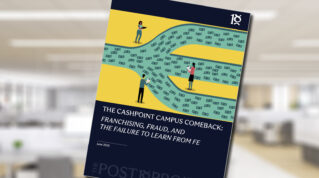Ministers have fought off attempts by MPs for greater parliamentary oversight of the lifelong learning loan entitlement as key legislation passes its House of Commons stages.
The lifelong learning (higher education fee limits) bill had both its report stage and third reading in the House of Commons on Wednesday in a debate lasting just 50 minutes.
Opposition MPs have been trounced at every turn in their attempts to amend the bill, with the government using its majority on the public bill committee and in the commons chamber to defeat them.
The bill was introduced by education secretary Gillian Keegan in February to lay the statutory groundwork for the lifelong loan entitlement (LLE), a flagship policy which, from 2025, will give some people access to student loans worth up to £37,000 for flexible courses at levels 4 to 6.
Under the LLE, which will promote short and modular courses for learners to upskill and retrain, the fees that education providers can charge will be based on a new system of credits. Proposed new laws gives the secretary of state powers to make a range of regulations setting out how credits will be funded in a year for different courses.
The government has faced criticism for bringing forward legislation which is so light on detail (it’s just nine pages long) and which hands ministers a host of new powers to make decisions without full scrutiny in parliament.
Earlier this year the government bowed to pressure from MPs to release more detail on the LLE by publishing their response to a consultation on the policy earlier than planned.
Defeated amendments yesterday would have required ministers to publish an annual review of the LLE and force the secretary of state to make a statement to parliament before using their new powers to set LLE regulations.
Matt Western, Labour’s shadow higher education minister, said an annual review should report on LLE learner uptake and was important because “accelerated courses were once poised to be the next big thing but never really materialised”. He added: “Recent policy announcements suggest the need for an enormous communications campaign, a large investment of resources and a clear understanding of the barriers to [learner] uptake.”
Responding for the government, skills minister Robert Halfon argued that an annual review was “neither necessary nor appropriate” before the policy had “sufficient time to bed in”.
Halfon also committed the government to “endeavour” to publish ministerial statements on regulations relating to LLE credits and fees, and pointed out that many of the regulations in the bill require both houses of parliament to agree.
Concluding the debate, Halfon said: “With this bill, we are transforming lifelong learning in this country. People will now be on a train journey with an end stop at which they get their qualification, but they will be able to start and stop at various points in their life through flexible and modular learning. This bill will be transformational, and I commend it to the house.”
Following yesterday’s short debate in the Commons, the DfE’s minister in the House of Lords, Baroness Barran, tabled the bill in the Lords for its first reading. A date for the bill’s second reading in the Lords has not yet been set.

















Your thoughts